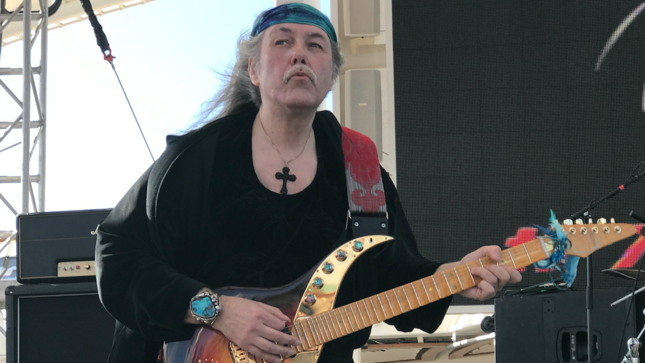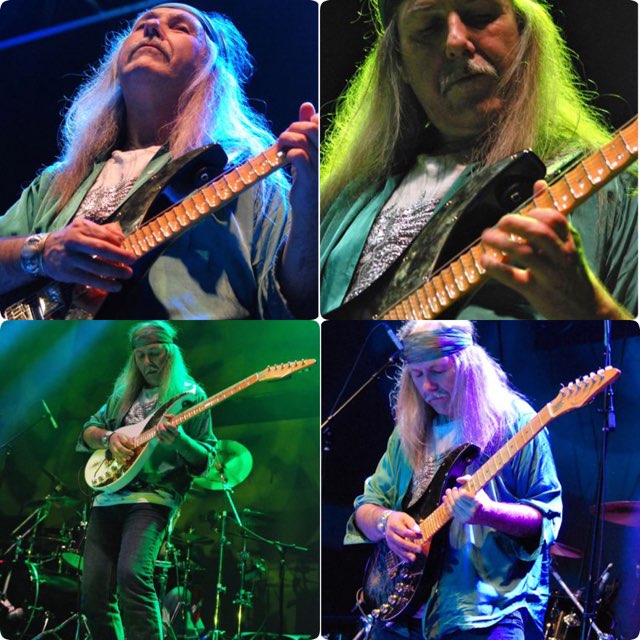
BraveWords had the honour of catching up with Scorpions guitar legend Uli Jon Roth on the recent 70000 Tons Of Metal cruise and we discussed a wide variety of topics including the influence of blues, his idol Jimi Hendrix and the recent passing of Jeff Beck. He also revealed that during COVID he didn’t pursue any new musical adventures, instead he wrote a massive tome which remains unpublished.
We begin with a sad day in early January when the entire music world was shaken with the passing of Jeff Beck. "I certainly learned a lot from him,” Roth tells BraveWords in an excerpt from our chat. “In 1975 when Blow By Blow came out, I used to listen to that album a lot and it gave me a good idea about several things. I also saw him live in 1972 when I was still in my early stages, and it was a truly phenomenal guitar sound, I remember. The only one who had a sound on that level, that I'd seen before and heard before, was Jimi Hendrix. So, Jeff Beck was always outstanding. I got to meet him once, a few years ago, and he was very, very nice to me, so I'll remember that as my little something. I've recently recorded a track in his honour, which has maybe a little bit of a Jeff Beck feel. Just after he died, I've got a Patreon channel, and in our Zoom conference I played that track for them live, and then I put it online. Yeah, and they seem to like it a lot. It was called ‘The Cry’. In fact, I'm going to play it on this ship here, as part of my Sky Academy thing, a special tribute to Jeff. And, come to think of it, just fifteen minutes ago I got a phone call from my good friend, John Oram, who's called the Father of British EQ - he's known for building all of these Trident mixers in the ‘80s, he was on tour, I chased him with the Beatles. He's goes way back, he's a pupil of (Thomas Walter) Jennings the founder of Vox, he's from those days, and he just said, 'We're going to do a track in honour of Jeff, written by Curtis Mayfield", and would I want to do the guitar for it? They're going to record it in Waters, in the studio, John Oram's studio, which is just around the corner from Jeff Beck's estate. And, I used to live there too, near Waters, I lived there for three years. I did a couple of albums here, yeah. I had a big farm there, it was beautiful, I loved it. So, that will bring back some memories."
BraveWords: Beck was a major loss. But as we age, our icons continue to fall. And some of these musicians are actual acquaintances and dear friends. How do you handle this?
Roth: "Yeah, I mean, you know, like Jeff Beck going away is really like the end of an era, because there are so few people left from that early ‘60s period who had the magical sound from back then. There's only a few people who still have that vibe about them. And that was that generation of Jimi Hendrix, of Eric Clapton, of Jeff Beck, he was one of those three. Then you have Jimmy Page, you have David Gilmour. Then, slightly later you have Ritchie Blackmore. England produced so many great guitar players, but those were the ones that basically wrote history on the guitar, and in rock, and Jeff Beck was one of them. He was at the real cutting edge. He wasn't quite as successful in monetary terms as Hendrix and Clapton, but his contribution to guitar playing, or rock, or music, was enormous."

BraveWords: And a lot of those guitar players you mentioned were inspired by the iconic blues players that hailed from the Deep South in the United States in the late 1800s and early 1900s. That's a lot of history. Were you inspired by the blues?
Roth: "Initially, yes. But I was inspired by the second generation. B.B. King, and Freddie King, those were the people, Albert King, those were the people who Jeff Beck looked up to in this generation. And I looked up to people like Eric Clapton to start with. Hendrix came a little bit later for me, and Jeff Beck came even later for me. But then, of course, being in love with the guitar, I checked out the roots, and I checked out Albert King, and I thought, 'Wow. Yeah', I could tell where Jimi Hendrix got his ‘Red House’ from. There was a lot of Albert King there, and of course, B.B. King. So, I relate to that, and I used to play the Blues, initially. But there came a point where I started to move more towards the classical and moved away from the Blues. But to this day what is still in my playing is these bendy, wailing notes, which comes from the Blues, including the Blue notes. And my way then was to kind of bring that and mix that in with the classical approach, which is sacrilegious for both worlds, I suppose. But, it kind of, for me, it works. I ended up playing things like Vivaldi's Four Seasons concertos, which is a violin concerto, on the lead guitar, and playing it with the feel of a rock guitar player although I know exactly how to do it the puritan classical way. I chose to do it in this way. And a lot of people in the classic world, they really understood that, and they liked it, and they said, 'Yeah, absolutely'. But there was one guy who said, 'That's obscene vibrato!', and he was right. He got it. I mean, the word 'obscene' in terms of classical playing, baroque playing, I put some Hendrix vibrato into Vivaldi, and to some puritan people in the classical world, that's absolute sacrilege and the height of bad taste. I'm guilty of this, and I'm a little bit proud of it, because I think the end-result was quite exhilarating. At least for my ears!"
BraveWords: Don't you find it interesting that, if you connect the dots going way back to the blues era, those are the roots of hard rock and heavy metal.
Roth: "Oh yeah, absolutely. Of course. There would be no heavy metal without bands like Cream and Led Zeppelin up front. But all of these are completely different from what metal is nowadays. They were a lot more daring, they were a lot more dangerous in the true sense of the word, because all that stuff had never been done before. It felt that way. I remember what it felt like to listen to Jimi Hendrix back then, it was revolutionary, the sound. Now, the metal of the ‘80s and ‘90s became a lot more corporate. It became - they used more aggression, louder, faster, whatever - thinking that this would make it more 'dangerous'. But, to me, it isn't. These other elements are more in the field of being creative and coming top with something really new. So, metal actually didn't really bring that much new. I felt it was, in a way, a step back. Because all these bands like Cream, Hendrix, these trailblazers, Led Zeppelin... Of course, the Yardbirds very early on. But also then, later, Deep Purple, Black Sabbath, they all had one thing in common, they were playing loud, wild - The Who - but extremely dynamical within that. Now, this dimension of dynamics, in metal it doesn't exist. The foot is always, the pedal is, always at 120. Not at 110, at 120. The speed is very often, like, totally over the top, and everything is hyper distorted and hyper aggressive, down to the last minute detail. So, it's almost like a caricature of what it once was, and that is what it sounds like to me. That's why I'm not a fan of metal, never have been. But, then again, what is metal? Like, if I speak to Bruce Dickinson, for instance, and we had this discussion once. I said, 'You're not really metal, you’re a hard rock band', and he completely agrees, you know? Because Maiden is still old-school. They still play with these dynamics. Yes, they play distorted, but they still have this old-school kind of organic touch, this organic feel, which you can touch with your hands almost. Metal always has an abrasive edge that I don't like. So, that's why I'm not a big fan of metal. Never have been, never will be. Are there good bands in metal? Of course there are. Are there some great pieces? Yes, of course there are, I don't deny any of that. It's just, most of it doesn't speak to me."
Stay tuned for the entire BraveWords feature soon.
(Uli Jon Roth collage by Jennifer Bartram-Schmitt)